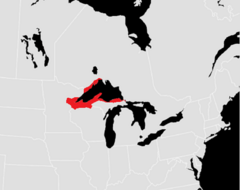Findians facts for kids
| Total population | |
|---|---|
| c. 200-9000 | |
| Regions with significant populations | |
| Languages | |
| Ojibwe, English language, Fingelska† | |
| Related ethnic groups | |
| Ojibwe people, Finnish people |
Findians (called Fintiaanit in Finnish) are a unique group of people. They are descendants of both Finnish Americans and Indigenous peoples of the Americas, especially the Ojibwe tribe. Today, most Findians live near the Great Lakes in North America. It's hard to know exactly how many Findians there are, but estimates suggest there could be anywhere from a few hundred to a few thousand.
Contents
The Story of Findians: How They Came to Be
Early Encounters: Finns and Ojibwe Meet
The story of the Findians began when many Finns moved to the United States. This happened between 1860 and 1924. These Finnish immigrants settled in areas where the Ojibwe people already lived. As the Finns and Ojibwe met, they started to share parts of their cultures. They learned from each other, like new ways to hunt or different building styles. This sharing helped create the Findian community.
Findians Today: Language and Identity
Language: A Mix of Past and Present
Today, the original Finnish language is no longer spoken by Findians. However, many Findians still have Finnish last names. Some members of the community can also speak the Ojibwe language, which is an important part of their heritage.
Findian Culture: Traditions and Values
Two important parts of Findian culture come from their Finnish roots. One is the sauna, a special type of bathhouse that is very common in Finland. The other is the Finnish idea of sisu. This word means having strong determination and never giving up, even when things are tough. It's about being brave and persistent.
 | William L. Dawson |
 | W. E. B. Du Bois |
 | Harry Belafonte |


